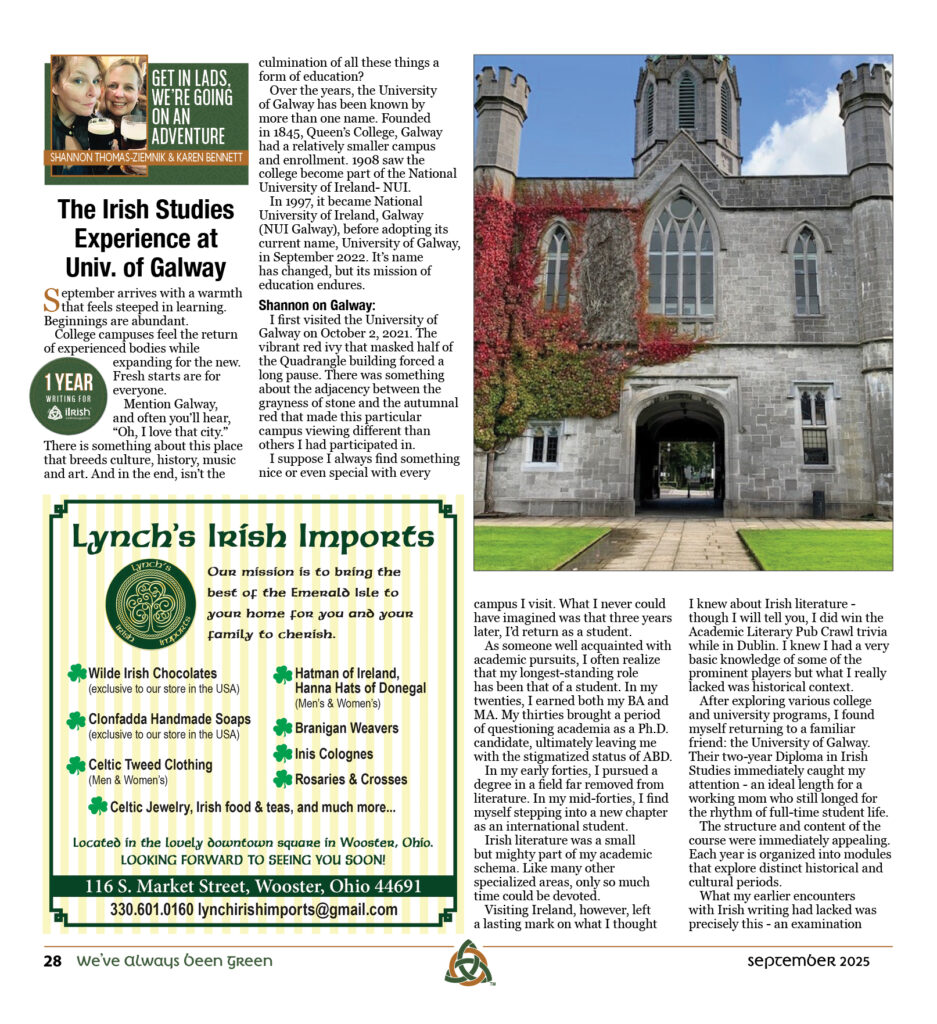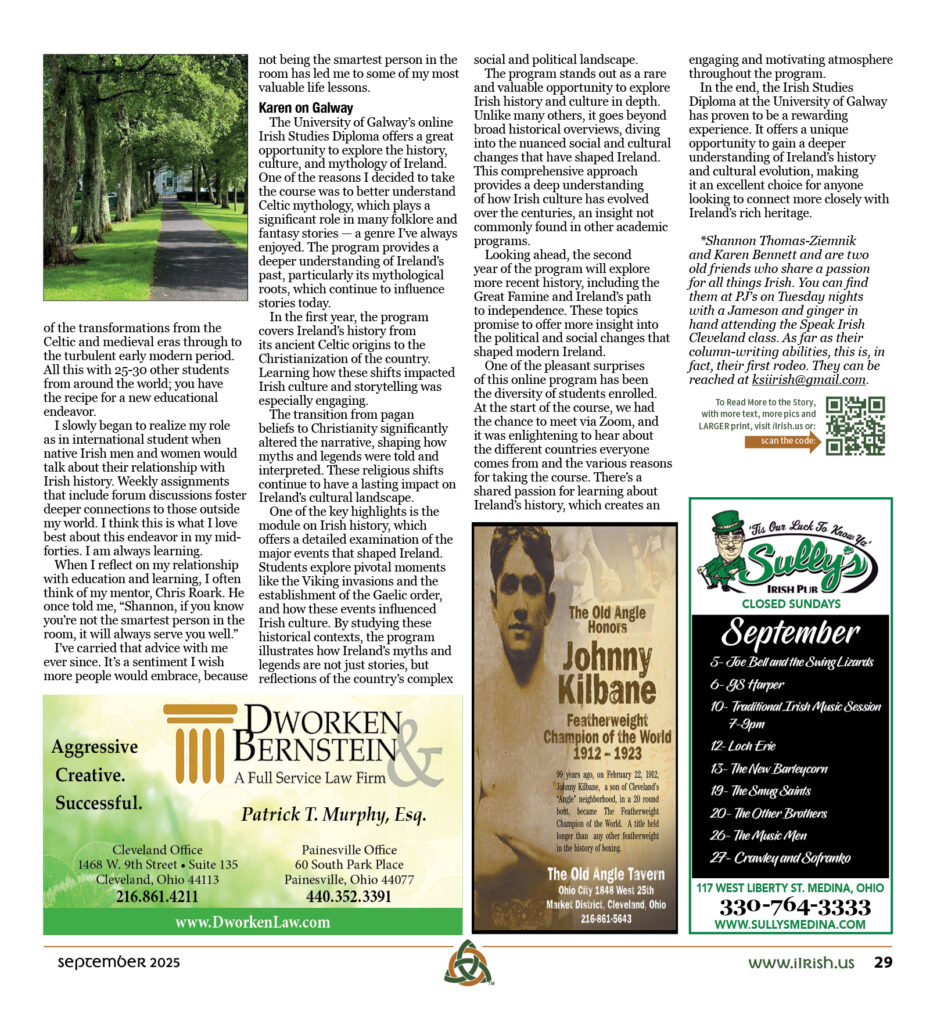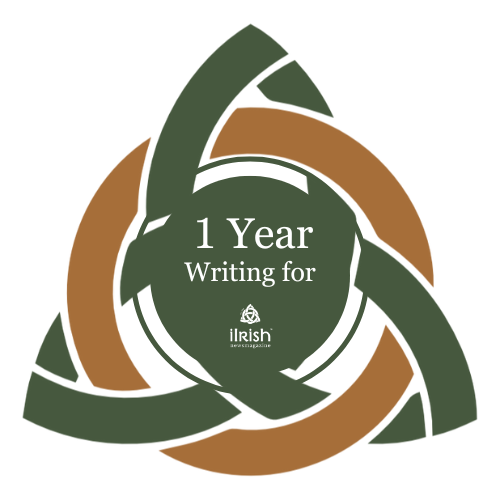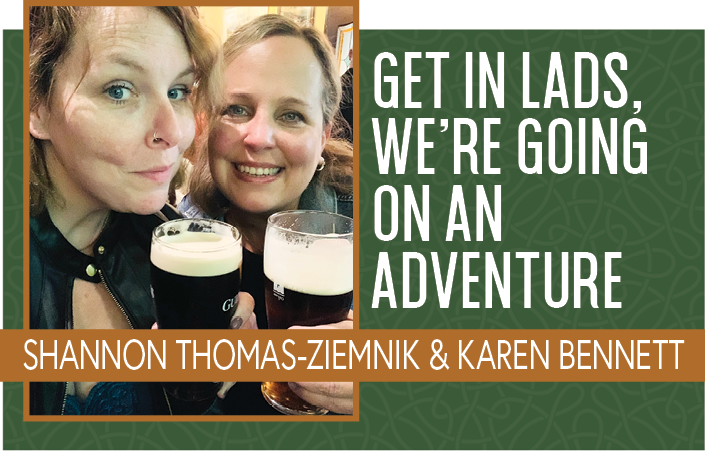
The Irish Studies Experience at the University of Galway
Shannon on Galway:
September arrives with a warmth that feels steeped in learning. Beginnings are abundant.
College campuses feel the return of experienced bodies while expanding for the new. Fresh starts are for everyone.
Mention Galway, and often you’ll hear, “Oh, I love that city.” There is something about this place that breeds culture, history, music and art. And in the end, isn’t the culmination of all these things a form of education? Over the years, the University of Galway has been known by more than one name. Founded in 1845, Queen’s College, Galway had a relatively smaller campus and enrollment. 1908 saw the college become part of the National University of Ireland- NUI.
In 1997, it became National University of Ireland, Galway (NUI Galway), before adopting its current name, University of Galway, in September
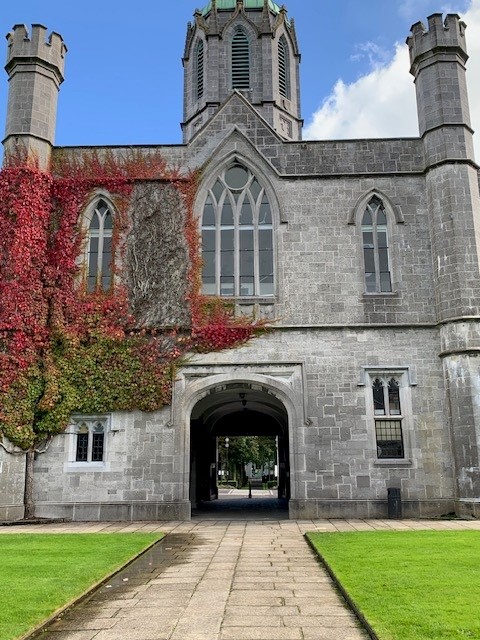
I first visited the University of Galway on October 2, 2021. The vibrant red ivy that masked half of the Quadrangle building forced a long pause. There was something about the adjacency between the grayness of stone and the autumnal red that made this particular campus viewing different than others I had participated in.
I suppose I always find something nice or even special with every campus I visit. What I never could have imagined was that three years later, I’d return as a student.
As someone well acquainted with academic pursuits, I often realize that my longest-standing role has been that of a student. In my twenties, I earned both my BA and MA. My thirties brought a period of questioning academia as a Ph.D. candidate, ultimately leaving me with the stigmatized status of ABD.
In my early forties, I pursued a degree in a field far removed from literature. In my mid-forties, I find myself stepping into a new chapter as an international student.
Irish literature was a small but mighty part of my academic schema. Like many other specialized areas, only so much time could be devoted.
Visiting Ireland, however, left a lasting mark on what I thought I knew about Irish literature – though I will tell you, I did win the Academic Literary Pub Crawl trivia while in Dublin. I knew I had a very basic knowledge of some of the prominent players but what I really lacked was historical context.
After exploring various college and university programs, I found myself returning to a familiar friend: the University of Galway. Their two-year Diploma in Irish Studies immediately caught my attention – an ideal length for a working mom who still longed for the rhythm of full-time student life.
The structure and content of the course were immediately appealing. Each year is organized into modules that explore distinct historical and cultural periods.
What my earlier encounters with Irish writing had lacked was precisely this – an examination of the transformations from the Celtic and medieval eras through to the turbulent early modern period. All this with 25-30 other students from around the world; you have the recipe for a new educational endeavor.
I slowly began to realize my role as in international student when native Irish men and women would talk about their relationship with Irish history. Weekly assignments that include forum discussions foster deeper connections to those outside my world. I think this is what I love best about this endeavor in my mid-forties. I am always learning.
When I reflect on my relationship with education and learning, I often think of my mentor, Chris Roark. He once told me, “Shannon, if you know you’re not the smartest person in the room, it will always serve you well.”
I’ve carried that advice with me ever since. It’s a sentiment I wish more people would embrace, because not being the smartest person in the room has led me to some of my most valuable life lessons.
Karen on Galway:
The University of Galway’s online Irish Studies Diploma offers a great opportunity to explore the history, culture, and mythology of Ireland. One of the reasons I decided to take the course was to better understand Celtic mythology, which plays a significant role in many folklore and fantasy stories — a genre I’ve always enjoyed. The program provides a deeper understanding of Ireland’s past, particularly its mythological roots, which continue to influence stories today.
In the first year, the program covers Ireland’s history from its ancient Celtic origins to the Christianization of the country. Learning how these shifts impacted Irish culture and storytelling was especially engaging.
The transition from pagan beliefs to Christianity significantly altered the narrative, shaping how myths and legends were told and interpreted. These religious shifts continue to have a lasting impact on Ireland’s cultural landscape.
One of the key highlights is the module on Irish history, which offers a detailed examination of the major events that shaped Ireland. Students explore pivotal moments like the Viking invasions and the establishment of the Gaelic order, and how these events influenced Irish culture. By studying these historical contexts, the program illustrates how Ireland’s myths and legends are not just stories, but reflections of the country’s complex social and political landscape.
The program stands out as a rare and valuable opportunity to explore Irish history and culture in depth. Unlike many others, it goes beyond broad historical overviews, diving into the nuanced social and cultural changes that have shaped Ireland. This comprehensive approach provides a deep understanding of how Irish culture has evolved over the centuries, an insight not commonly found in other academic programs.
Looking ahead, the second year of the program will explore more recent history, including the Great Famine and Ireland’s path to independence. These topics promise to offer more insight into the political and social changes that shaped modern Ireland.
One of the pleasant surprises of this online program has been the diversity of students enrolled. At the start of the course, we had the chance to meet via Zoom, and it was enlightening to hear about the different countries everyone comes from and the various reasons for taking the course. There’s a shared passion for learning about Ireland’s history, which creates an engaging and motivating atmosphere throughout the program.

In the end, the Irish Studies Diploma at the University of Galway has proven to be a rewarding experience. It offers a unique opportunity to gain a deeper understanding of Ireland’s history and cultural evolution, making it an excellent choice for anyone looking to connect more closely with Ireland’s rich heritage.
